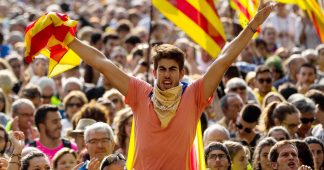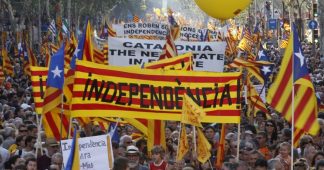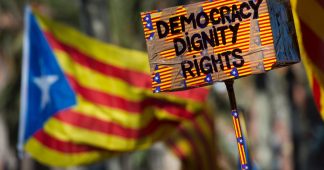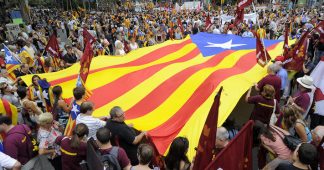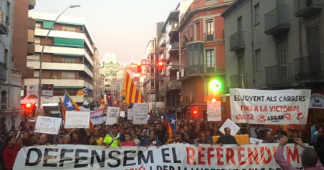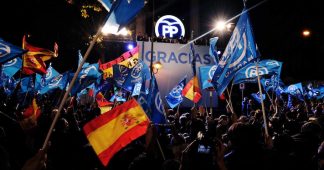Podemos MP Manolo Monereo discusses the road from Spain’s political crisis to the standoff over Catalan independence.
The crackdown intensified this past Wednesday with the arrests of fourteen high-level Catalan officials, including the regional economy minister Josep Maria Jove who is now being investigated for sedition. This comes on the back of a series of police raids on newspapers, printers, delivery services, and regional government offices, with authorities confiscating 1.5 million posters and leaflets and 10 million ballot papers. Public prosecutors issued summons to the more than 700 mayors cooperating with the preparations for the referendum, while political events related to the vote have been banned in a number of cities across Spain.
The arrests on Wednesday were described as a “democratic scandal” by Barcelona’s major Ada Colau and sparked mass protests across Catalonia. In Madrid pro-independence MPs walked out of the Spanish parliament while Podemos’s parliamentary group staged a protest on the steps of the Congress. Just before this protest, Podemos MP Manolo Monereo sat down with Jacobin contributor Eoghan Gilmartin to discuss the crisis and how the current standoff could benefit the Right in Spain.
EG What is the background to the current push for Catalan independence?
MM Since 2008 we have been living through a regime crisis in Spain, characterized by a breakdown in the basic constitutional principles of the post-Franco transition. This regime crisis is characterized by three key problems that are intimately related: the first is the question of corruption, a series of scandals which have completely discredited the political system; the second is the social question, which we see with increasing unemployment, inequality, and precariousness which primarily affects the younger generation; and the third is the national crisis.
This third element can be traced back to the Constitutional Court’s 2010 ruling against the new Statute of Autonomy for Catalonia. The Catalan Statute had been the result of negotiations between Zapatero’s center-left government in Madrid and the regional government in Barcelona. Support for independence in Catalonia has historically been low but after this ruling by the court many of those in favor of greater autonomy were transformed into independence supporters. This opened up a new dynamic in Spanish politics.
The difficulty is that these three questions have not always been united into a single project. Often, the national question is counterposed to the social question. This strengthens the hand of the government, and this division of problems divides the people.
EG How do you view the reaction of Rajoy’s government to the Catalan crisis?
MM Rajoy is an intelligent man. He has tried to combine the interests of the Spanish state with the political strategy of his own party. The Popular Party (PP) has never been a major force in Catalonia, a reality which facilitates this policy. Rajoy has used the crisis to win back legitimacy for the PP after its corruption scandals. It has taken on the role of the defender of Spain and of the constitution. They have constructed a theory of constitutional nationalism that serves them — and Ciudadanos — but which made a confrontation between the forces of public order and the Catalan population inevitable. This has left Spanish democracy in a state of exception.
EG How do you see this playing out in the days before October 1? Is there going to be a referendum?
MM No.
EG No type of vote?
MM No. There will be a strategy of resistance in Catalonia: the occupation of city squares — similar to the Ukraine recently — and a possible general strike. Against this there will a massive buildup of police forces. We have to wait and see what happens with the army but the public order units, the most aggressive elements of the police force, are already present.
EG What will be the wider consequences of the current crackdown?
MM It will place our democracy in danger. The crisis could be used to move us towards a new, more authoritarian situation along the lines of Poland or Hungary.
EG What about international opinion? Is such a crackdown going to create external pressure from Europe?
MMEurope is not going to do anything. The EU is an instrument primarily designed to defeat the popular classes. After Brexit, Spain’s weight has increased and Rajoy has done everything demanded of him by the European institutions in terms of structural adjustments. So the EU is going to back him. It has not intervened in Poland or Hungary and it won’t here. What is fundamental to the EU is the imposition of neoliberal reforms; questions of free speech and social rights are secondary.
Catalan, Basque, and Galician nationalism have typically seen European integration as key to their independence, particularly those on the Right. They have been pro-Europe, believing the EU could resolve Spain’s historical problems. Now they realize this will not be the case. Europe is reinforcing the position of the Spanish state. Spain under Rajoy is a key ally for Merkel.
So, our question — what is the point of Catalan independence within a German-dominated Europe when your sovereignty has already been robbed by the economic powers? — is becoming more, not less, relevant.
EG It seems that Podemos has struggled to find space in a debate polarized between the PP and pro-independence forces. Is that a fair assessment?
MM Yes, because we are federalists rather than pro-independence. We have tried to construct a third position, opening a debate on the need for a new type of state, a federal and plurinational state based on consensual unity. But a condition of such unity is the right to decide via a referendum. We have always supported a negotiated referendum that would allow the Catalan people to decide their own fate.
What we must also emphasize is the need for a political solution that passes through a constituent process, one capable of confronting the questions at the root of the crisis. Our difficulty is how to unite the Catalan question with the others that underpin this crisis, namely, political corruption and social inequality.
EG Did the pro-independent forces underestimate the power of Spanish nationalism?
MM The pro-independence forces underestimated the lengths to which the state would go but also the intensity of national sentiment. The problem is that independence cannot take place when a large part of the rest of Spain refuses to accept it. If there is no legal route to a referendum and if there are not sufficient political forces in the rest of the state able to dispute the hegemony of Spanish nationalism, how can you move forward? Only by changing the agenda, meaning, linking the national question to the social ones.
EG What is the position of the newly re-elected PSOE [the center-left Socialist Party] leader Pedro Sánchez on the Catalan crisis?
MMHe is in a dilemma. A substantial part of his party is very close to the PP on this issue and so he is scared of an internal rupture. At the same time, when he talks of a federal state, it is never clear what he is proposing. If he ends up supporting Rajoy, it could mean a new restoration along nationalist lines.
EG How has Podemos’s position on PSOE changed after Sánchez’s re-election on a relatively left-wing platform? Is there a possibility of an agreement between the two parties?
MM We are exploring the possibility of an agreement but it won’t be easy. It would be very complicated not only for ideological reasons but also for political ones. There is a part of the Socialist Party firmly opposed to any pact.
Pedro Sánchez has two potential paths. The first is to realize he cannot govern without Unidos Podemos [Podemos’s combined slate with Izquierda Unida] and so in the next elections PSOE and Unidos Podemos reach an electoral agreement that could have an absolute majority in the two chambers of the congress. We could even imagine obtaining a sufficient majority to bring about changes to the constitution.
The second is for him to position PSOE as the dominant force on the Left while trying to undermine Unidos Podemos, and then move to the center afterwards. Of course, these two alternatives could also be combined. Right now my opinion is that PSOE and Pedro Sánchez are aiming to reduce the political, electoral, and social weight of Unidos Podemos, with the hope of reaching office with our reduced support of about 30 or 35 deputies.
Either way, I think this is the last year of this legislature. When the government failed to win a majority backing their position on Catalonia, there was proof of this. If there is no motion of no-confidence against the government, there will be elections sometime in the new year after the government passes the budget.
